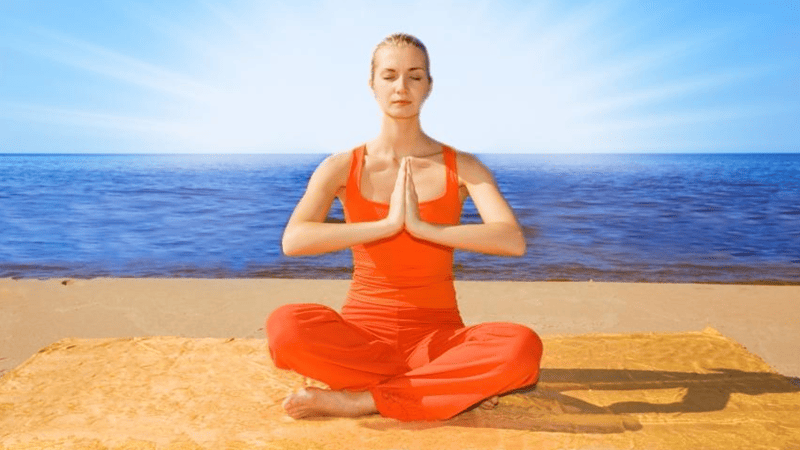
How Yoga Improves Your Ability to Deal With Stress
How Yoga, a Timeless Practice, Empowers You to Navigate Life's Challenges Mindfully - By Beth Rush
Reading time: 5 minutes
Learning to sit with discomfort and respond to it mindfully is an essential life skill.
Stress is a modern epidemic. While human ancestors at least caught a breather in between running from hungry bears, many people today face threats that never disappear, like the struggle to make rent on too little paycheck. This unrelenting pressure causes countless mental and physical health issues, but not everyone can afford professional treatment. Yoga is a valuable way to improve your ability to deal with stress that’s free and accessible to all.
How does this ancient practice work modern magic? Which type of yoga is best for stress? Here’s how yoga improves your ability to manage tension and weather life’s storms.
How Yoga Helps Manage Stress
Yoga* teaches you to manage stress through several avenues. Best of all, she is a gentle teacher, revealing lessons as you’re ready to receive them. It’s the ideal practice for many, especially if you feel like your life has spiraled out of control but you don’t know why. Nobody lectures you on the “right” way to act, but you arrive at deep truths and, often, solutions to pressing problems through mindful movement on the mat.
Here’s how the magic of yoga helps manage stress.
1. Mindful Awareness of How Stress Manifests
Focus your awareness on your jaw — just notice it. Is it currently clenched or relaxed? If it’s tight, you could be physically manifesting stress without realizing it. Unwittingly, though, you compound your problems. That tooth-grinding leads to headaches and quite possibly steep dental bills, and good jobs are hard to find when you lose teeth.
Yoga teaches you how to notice your physical stress manifestations and manage them through gentle movement and deep breathing. Alone, both have the power to dissolve tension, and they’re even more powerful when combined. Consider the following:
- A 2023 meta-analysis of 12 studies involving 785 participants showed that breathwork reduced stress and subjective measures of anxiety.
- Another 2023 study indicated that participating in yoga made people more aware of their need to relax and encouraged them to make additional healthy lifestyle choices to reduce stress.
You can’t correct that which you remain unaware of. By tuning into your body through mindful movement and body scan meditations, you learn to identify how your body manifests stress. It can also alert you to possible physical problems. You can use your time on the mat to explore these, mentally prepare questions to ask your doctor and even relax before appointments.
2. Training Yourself to Manage Discomfort
What is stress, anyway? It’s stimuli that your central nervous system hasn’t adapted to endure. How can you increase your endurance? By gradually exposing yourself to increasing stressors and learning how to manage them through deep breathing and intentional relaxation.
Even gentle practices like Yin and restorative yoga involve entering into some uncomfortable poses. However, it’s voluntary — the only person forcing you to endure the agony is yourself. By breathing through mild discomfort, the good kind that releases your fascia and eases pain, you train your central nervous system to tolerate stressful situations without becoming dysregulated.
3. Encouraging Other Healthy Interventions
Mindfully tuning into your body through breath and movement teaches you more about yourself than any anatomy class. It also gives you a deeper appreciation for your physical self and what it can do. From there, it’s natural to want to nurture yourself more.
You might find that your yoga practice inspires you to:
- Eat more healthfully: Consuming more fresh, whole foods, particularly those high in certain nutrients like omega-3s, also combats stress.
- Reduce unnecessary sources of stress: Your time on the mat provides space for working through problems. Such breakthroughs can help you find ways to move on from toxic jobs and relationships without causing you undue struggle or strife.
- Cut back on unhealthy foods and eliminate toxic substances: A healthier relationship with your body makes it easier to say no to things that aren’t good for you, like alcohol. It also raises your awareness of the effect of environmental toxins, encouraging greater sustainability. A cleaner planet equates to healthier humans.
What Type of Yoga Is Best for Stress?
The best type of yoga for stress ultimately depends on you. It’s all a part of getting to know yourself and your nervous system on the mat. Some people may need to release tension through a higher-energy practice like Ashtanga or power yoga. Others may crave nothing more than a gentle surrender.
1. The Right Type of Yoga for You
If you prefer to burn off steam through an intense flow, consider the following yoga forms:
- Ashtanga
- Bikram
- Power yoga
- Vinyasa
However, if you want a purely relaxing, indulgent experience, consider:
- Yin
- Restorative yoga
Of course, you may find solace in any style. Many people enjoy Hatha classes, as many guides include the right blend of challenge and relaxation to encourage stress relief.
2. Using Yoga With Other Activities
Finally, you can use yoga as an adjunct to other stress-relieving activities. For example, athletes who need to blow off steam before relaxing might go for a run before sinking into a restorative class.
You’re not alone if you struggle to squeeze an hour of yoga into your already busy day. However, you don’t have to dive into a 90-minute retreat to reap the benefits. A few minutes of mindful movement in the morning and again before bed starts and ends your day right, helping you feel centered before the hecticness begins and sink into sleep in the evening.
Yoga and Stress
You now have a better understanding of how yoga helps manage stress. Best of all, it’s free and accessible to everyone.
The best kind of yoga for stress depends on you. Explore a class today and reap the tension-taming benefits.
*commission earned from this link.







